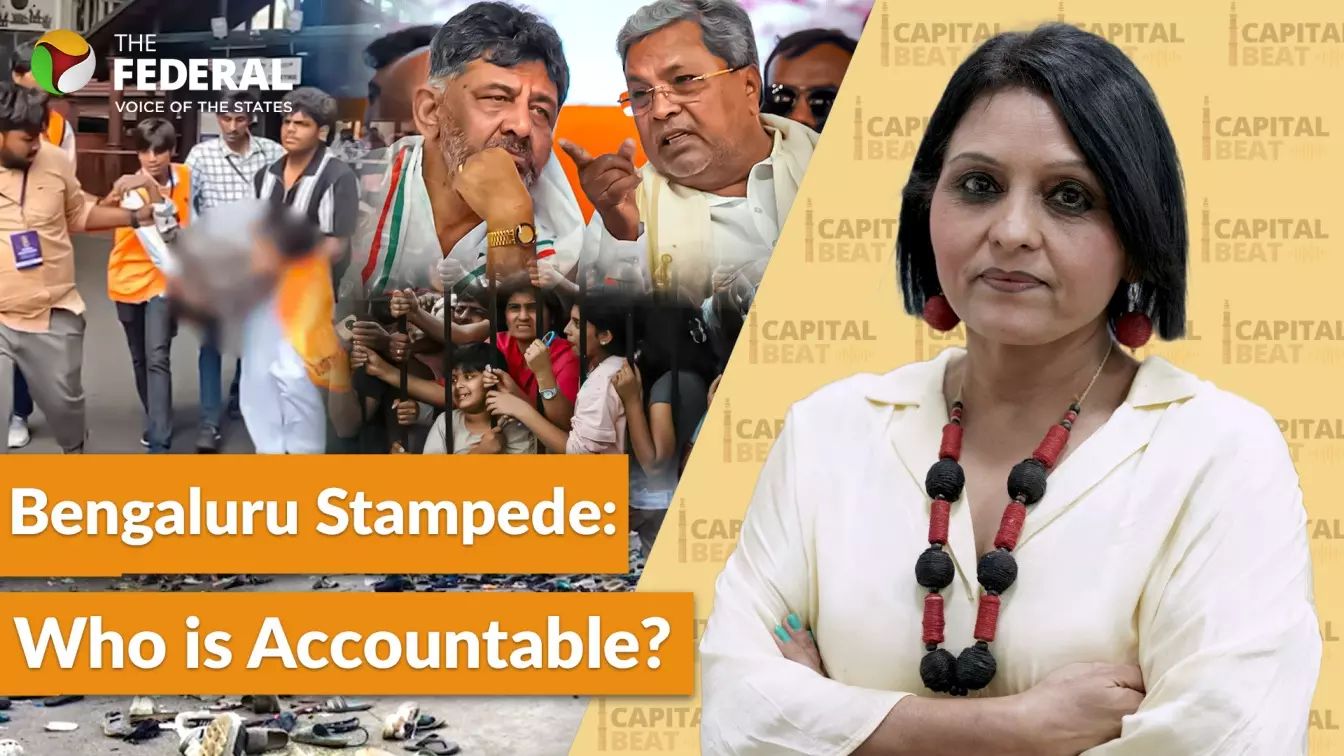
Bengaluru stampede: Is Congress digging its own grave in Karnataka?
Siddaramaiah and DK Shivakumar under fire after stampede; is Congress dodging blame as complaint against Kohli grabs headlines?

In this episode of Capital Beat, panellists M Siddaraju, KS Dakshina Murthy, Nagaraju Yadav, and Siddharth Sharma weigh in on the political and administrative lapses surrounding the tragic June 4 Bengaluru stampede.
With accusations flying against Chief Minister Siddaramaiah and Deputy CM DK Shivakumar, the discussion probes whether shadow boxing within the Congress worsened the disaster.
Shadow boxing in government?
KS Dakshina Murthy opened the discussion by acknowledging the persistent tensions between Siddaramaiah and Shivakumar, but cautioned against pinning the entire blame on their rivalry. “If we focus only on that, it will be a disservice,” he said, underlining that the stampede exposed deep systemic failures in Karnataka’s crowd-control mechanisms.
While the political blame game is unfolding, Dakshina Murthy stressed that structural corrections in administrative preparedness are urgently needed. “Crowds in Chinnaswamy Stadium are not new,” he said, “but the failure lies in how the state prepares for such moments.”
He also criticised the scapegoating of police officers, saying, “It’s unfair to single out individuals when the entire system, including crowd planning, failed.”
Also read: Bengaluru stampede a case of sub-nationalistic passion fuelling sporting frenzy
Is the Congress on the back foot?
Senior Congress MLC Nagaraju Yadav strongly objected to opposition leader R Ashoka’s claim that competition for credit between the CM and Deputy CM triggered the mishap. “That is ridiculous and nonsense,” Yadav said. “There is no shadow boxing. Decisions are collective.”
However, he admitted lapses in execution. “Yes, there were failures. But blaming it on photographs or political rivalry is just dirty politics,” he added, urging the BJP to offer constructive criticism instead.
Yadav also criticised the BJP for politicising the tragedy. “Would you blame the governor, too, who was present at the event? Everyone was excited. This was an accident, not a government-sponsored act.”
Also read: Bengaluru stampede turns spotlight on 'accountability gaps' by event firms in Chennai
Was the celebration necessary?
Veteran journalist M Siddaraju questioned the state government’s decision to honour a private IPL franchise at the Vidhana Soudha. “RCB didn’t win for Karnataka. Why use taxpayers’ money to felicitate a private team?” he asked.
Siddaraju argued that the tragedy could have been avoided entirely if the government had stayed away from organising the event. “There was no compulsion for the state to step in,” he said. “They invited trouble.”
He also criticised the suspension of officials, suggesting it was meant to deflect attention from the political leadership.
Also read: Bengaluru stampede: Fatal twist for dental student, Bosch employee; kin recount teary tales
A systemic safety lapse
Siddharth Sharma framed the incident in broader terms. “In any democracy, the government’s primary job is to ensure safety,” he said, comparing the Chinnaswamy stampede with the Palgham terror attack and the Kumbh Mela stampede.
He noted the contradiction in organising a second event 30 minutes after a successful public felicitation nearby. “What was the need to hold the same event again, in a closed stadium, with only a fraction of the capacity?” he asked.
Sharma also highlighted the fragmented control over the venue. “The land belongs to the Army, it’s managed by the government, owned by BCCI’s KSCA, and the event was outsourced to a private firm. Yet no one took charge,” he said.
Also read: Bengaluru stampede: What exactly happened? Timeline, and other details
Transparency vs resignation demands
While the BJP is demanding resignations, Sharma and other panellists dismissed this as opportunism. “Did the Home Minister resign after Pulwama? No. So why should Siddaramaiah or Shivakumar do so?” Sharma asked.
However, he credited the government for transparency. “They announced the numbers quickly, launched a magisterial inquiry, and initiated police action,” he said. “That’s more than what’s been done in similar tragedies in the past.”
Yadav agreed, promising that Karnataka would “learn hard lessons” and deliver justice. “Safety will be our top priority going forward,” he said.
While political rivalries within the Congress remain under scrutiny, the panel agreed that the Bengaluru stampede was the result of a complex systemic failure. From the police and administration to private organisers and the crowd itself, the tragedy reflected gaps in coordination, planning, and accountability.
Yet, the panellists urged against politicising the loss of lives and called for structural reforms to ensure such incidents are never repeated.
(The content above has been generated using a fine-tuned AI model. To ensure accuracy, quality, and editorial integrity, we employ a Human-In-The-Loop (HITL) process. While AI assists in creating the initial draft, our experienced editorial team carefully reviews, edits, and refines the content before publication. At The Federal, we combine the efficiency of AI with the expertise of human editors to deliver reliable and insightful journalism.)

